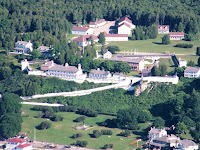This small island on the
western tip of Lake Huron reflects its history at every turn—some believe this
is why the ghosts on the island outnumber the living.
 |
| Mackinac Island |
Many have visited the island
for its beauty, but few know its hidden darker past.
Archaeologists have
determined the Anishinaabe Tribe, which was drawn to the area for its prime
fishing in 900 AD, first inhabited the island. These Native Americans
considered Mackinac sacred and used the area to bury their tribal leaders.
 |
| Fort Mackinac |
However, by the time the
first Europeans stumbled upon the island in the mid-1600s, it was deserted. The
French first settled the island, then the British took control of it in 1780 and
established Fort Mackinac.
Not long after, the Treaty of
Paris gave the island to the Americans.
During the War of 1812, the
British captured the island once more, despite numerous bloody attempts by the
Americans to take it back.
After this war in 1815, the
Treaty of Ghent put the island firmly back in American hands.
After the American Civil War, Mackinac became a popular tourist destination. It, after Yellowstone, was made
American’s second National Park.
 |
| Downtown Mackinac Island reflects the Victorian era like most buildings on the island. |
The island today still has no
bridge to the mainland. It is accessed from ferries, boats, and planes. No cars
are allowed on the island—which lends an old-world charm to the place.
Some believe this is why so
many ghosts linger.
 |
| Grand Hotel |
The island’s most famous
building is the Grand Hotel. When
this structure was built, many human skeletons were found. The workers unearthed
so many it is said they did not know what to do with them.
So they were just left
there—hence the Grand is built on a massive gravesite.
Two maintenance workers
checking the hotel’s theatre stage encountered a dark entity. They felt as if
they were being watched. Then one of these men glanced across the stage and saw
a dark mass with red glowing eyes.
Before he could react, this
entity quickly headed for him—knocking him down. Later, when he woke up in a
hospital, he refused to return to the Grand.
Other witnesses have spotted
a ghost wearing a top hat in the 2nd floor piano bar. They watched
as this entity just disappeared. Afterward, they smelled his cigar smoke.
Workers at the hotel claim a
woman dressed in Victorian clothing haunts their employee housing. Some have
experienced her lie down next to them as they slept.
At Fort Mackinac, ghost soldiers have been seen walking the Rifle Range Trail. Others have stated
they saw piles of amputated limbs in the fort’s hospital.
 |
| Fort Mackinac |
Furniture is known to move
around by itself, and at least thirteen ghosts of children have been heard. It is
believed they died of Typhoid Fever and Tuberculosis. Their cries are heard
echoing in the halls of the buildings where they once lived.
Located between Mission Point
Resort and downtown Mackinac is a 20-foot drop off a cliff. This area is called
The Drowning Pool.
It was here were women
accused of witchcraft were tortured.
These women worked in the
brothels that sprang up on the island in the late 1700s and early 1800s. They
were accused of witchcraft because they enticed supposedly unsuspecting
innocent men to their houses of ill repute.
Rocks were tied around these
women’s ankles, and they were thrown into the lagoon. If they sank, they were
considered innocent—but by then, they were dead.
It is believed this pool is
haunted by some of these victims. Shadows come out of the water silently. Also, no ripples are seen.
On the other hand, witnesses
report seeing huge splashes in the area that are too big for fish to make.
In Part ll of Michigan’s Mackinac Island stories about
the island’s most haunted area—Mission Point Resort are shared.

No comments:
Post a Comment